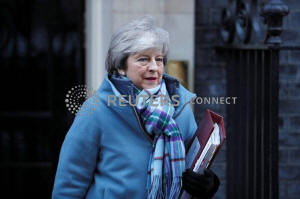|
Brexit brinkmanship: UK demands deal
change, EU says 'non'
 Send a link to a friend
Send a link to a friend
 [January 30, 2019]
By Guy Faulconbridge and Gabriela Baczynska [January 30, 2019]
By Guy Faulconbridge and Gabriela Baczynska
LONDON/BRUSSELS (Reuters) - British Prime
Minister Theresa May was on a collision course with the European Union
on Wednesday after lawmakers demanded she renegotiate a Brexit divorce
deal that the other members of the bloc said they would not reopen.
Less than two months before the United Kingdom is due by law to leave
the EU on March 29, investors and allies are trying to gauge where the
crisis will end up, with options including a disorderly Brexit, a delay
to Brexit, or no Brexit at all.
Two weeks after voting down May's Brexit deal by the biggest margin of
defeat for a government in modern British history, parliament demanded
she return to Brussels to replace the so-called Irish backstop, an
insurance policy that aims to prevent a hard border between Ireland and
Northern Ireland.
May said she would seek "legally binding changes" to the divorce deal
which she clinched in November with the EU after two years of tortuous
negotiations.

"There is limited appetite for such a change in the EU and negotiating
it will not be easy," May told lawmakers who voted 317 votes to 301 to
support the plan, which had the backing of influential Conservative
lawmaker Graham Brady.
In essence, May will try to use the implicit threat of a no-deal Brexit
to clinch a deal from the other 27 members of the EU whose economy is,
combined, about six times the size of the United Kingdom's.
The response from European capitals was blunt.
France, the EU's second most powerful member, said there could be no
renegotiation and demanded a "credible" British proposal. Germany has so
far not given a public comment.
European Council President Donald Tusk said the divorce deal was not up
for renegotiation. Tusk and May will have a phone call at 1745 GMT.
Sterling was trading at $1.3104 on Wednesday, down from $1.3190 reached
before lawmakers voted on Tuesday.
LAST MINUTE BREXIT?
May, an initial opponent of Brexit who won the top job in the chaos
following the 2016 referendum, is now locked into a game of brinkmanship
with the EU and her own split party.
While the EU has repeatedly refused to reopen the divorce deal, EU
sources said additional clarifications, statements or assurances on the
backstop might be possible.
May has said she would need more than an exchange of letters, but a
legally binding change. She would aim to bring back a revised deal by
Feb. 13. If not, parliament would vote on next steps on Feb. 14.
That deadline ratchets up the pressure on dedicated Brexiteers in the
Conservative Party who fear opponents will try to delay and ultimately
thwart Britain's exit.

Some diplomats and officials now think Britain's exit will not be
decided until the very last moment, though some senior officials also
warn that the risk of a disorderly no-deal Brexit is rising, as is the
probability of a delay to Brexit.
[to top of second column]
|

Britain's Prime Minister Theresa May is seen outside Downing Street
in London, Britain January 30, 2019. REUTERS/Peter Nicholls

Both May's Conservatives and the main opposition Labour Party are
formally committed to carrying out Brexit but internally divided
over how or even whether to do so.
Brexiteers accept there is likely to be some short-term economic
pain but say Britain will thrive in the long term if cut loose from
European rules. Pro-Europeans say Britainís exit will make it
poorer, reduce its global clout, undermine Londonís position as a
global financial capital and weaken the West.
Britain voted 52 percent to 48 percent to leave the EU in a 2016
referendum. Brexit supporters say it would betray democracy to fail
to act on that mandate. Opponents say voters may have changed their
minds now that the details are becoming clearer.
NO-DEAL BREXIT
Opposition Labour leader Jeremy Corbyn, who had refused to hold
talks on Brexit with May, said after Tuesday's vote that he was now
prepared to meet her. That meeting is due to take place on
Wednesday. A Labour source said Corbyn would tell May a no-deal exit
must be taken off the table and she should pursue his party's plan,
which includes a customs union.
If May cannot get a deal agreed, the default option would be to exit
the EU abruptly with no deal at all, which businesses say would
cause chaos and disrupt supply chains for basic goods.
British lawmakers on Tuesday approved a proposal calling on the
government to prevent a no-deal exit, sending a signal that a
majority opposes it. However, they rejected two amendments that set
out a clear path for parliament to prevent it.
Many company chiefs are aghast at London's handling of Brexit and
say it has already damaged Britainís reputation as Europeís
pre-eminent destination for foreign investment.

"Parliament at large signaled that it opposes a 'no deal' Brexit,
but it is not ready to delay Brexit to rule out 'no deal' entirely,"
Goldman Sachs said.
"The Eurosceptic wing of the Conservative Party, by contrast,
signaled that it opposes the prime ministerís Brexit deal, and it is
ready to risk 'no deal' to re-negotiate the terms on offer."
Goldman raised its probability of a no-deal Brexit to 15 percent
from 10 percent, kept its probability of a delayed Brexit at 50
percent and revised down its probability of no Brexit to 35 percent
from 40 percent.
(Writing by Guy Faulconbridge; Additional reporting by Kate Holton
and Elizabeth Piper; Editing by Angus MacSwan and Peter Graff)
[© 2019 Thomson Reuters. All rights
reserved.]
Copyright 2019 Reuters. All rights reserved. This material may not be published,
broadcast, rewritten or redistributed.
Thompson Reuters is solely responsible for this content. |